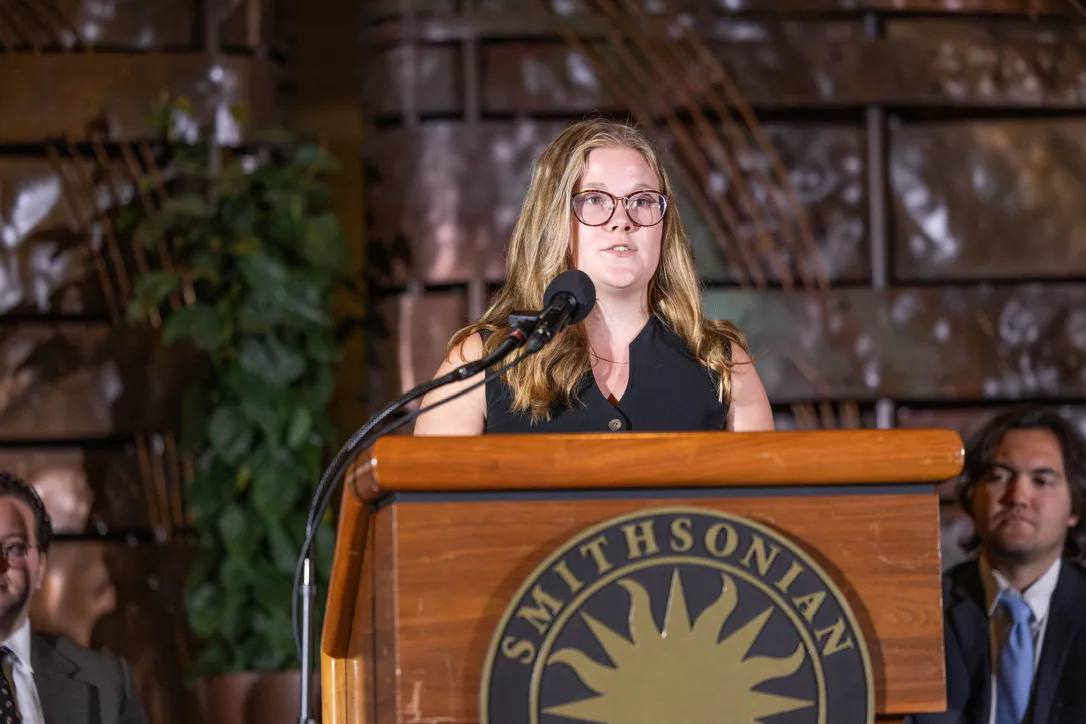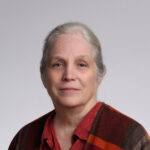Elizabeth Hanechak of Russell gives a speech at the Smithsonian Institute National Museum of the American Indian in Washington, D.C., on Sept. 6, after being formally given the Davidson Fellows scholarship.
Reminder Publishing submitted photo
RUSSELL — Elizabeth Hanechak, 18, of Russell has been awarded a $100,000 scholarship for her project, “Solving the Plastic Problem: Developing a Microbial System for the Bioremediation of Plastic Waste into Drinkable Water and Fertilizer Material.”
The Davidson Fellows Scholarship is one of the nation’s most prestigious honors for students 18 and younger. Hanechak’s award is part of the program’s 25th anniversary year, which is granting a record $825,000 to 21 students nationwide.
Hanechak, who is in the first semester of her freshman year at Brandeis University in Waltham, where she is a double major in biochemistry and biological physics, said the scholarship may be used to pay for college over a ten-year period. “If I don’t use all the money for undergraduate, I can use it for a master’s or PhD,” she said.
The project for which she was recognized as a Davidson Fellows is the continuation of an independent science project that she began as a freshman at Pope Francis Preparatory School in Springfield and continued throughout high school, first using the science labs at Westfield State University and then transferring to the labs at University of Massachusetts, where she said there were more resources.
Along the way, Hanechak received recognition and awards that took her as a junior to the Regeneron International Science and Engineering Fair in Dallas, Texas in 2023, where she received a second-place, $2,000 award in microbiology.
Putting her project in plain English that year, Hanechak explained that she was mostly focused on trying to find a practical solution to the plastic problem. She said recycling doesn’t really work, because less than 4% of the 51 million tons of plastic in the U.S. gets recycled annually; and incineration doesn’t work, as it is well known that burning plastic releases toxic chemicals.
Through her research, Hanechak has now developed a microbial system that converts plastic waste into fertilizer and drinkable water. Her process uses a genetically modified enzyme that she developed to break down plastics within 24 hours and a naturally occurring microalgae strain to neutralize the resulting toxins, producing safe fertilizer material. Designed to be low-cost and scalable, the system could help communities struggling with plastic pollution by restoring farmland, cleaning waterways and improving public health.
Hanechak said her most recent breakthrough came when she figured out how to get rid of the toxic compounds left behind after the enzyme breaks down the plastic — in this case ethylene glycol and terephthalic acid, the most common type of plastic waste — into liquid. She said micro-algae feeds off the carbon in the compounds and is able to remove them from the solution.
“Then the algae itself goes into these processes… makes biomass which settles into the bottom of the solution and can be harvested and used as fertilizer.” She said the biomass is high in nutrients and good for crops, and once removed, the liquid can be filtered as a source of water.
Hanechak applied for the Davison Fellowship in February, submitting the “entire project from start to finish,” a 42-page document, excluding references that brought it to 60 pages, that represented four years of work. She was notified over the summer that she was awarded the fellowship, which was formally presented to her at the Smithsonian Institute National Museum of the American Indian in Washington, D.C., on Sept. 6.
“For 25 years, the Davidson Fellows Scholarship has recognized some of the most remarkable research undertaken by young people in the nation,” said Bob Davidson, founder of the Davidson Institute. “The 2025 class of Fellows continues to raise the bar for achievement as we celebrate this milestone year, marked by innovation, perseverance and the hundreds of alumni whose work continues to make a lasting difference in their fields and communities.”
“The Davidson Institute scholarship is unique to me because it recognizes the focus and determination that is innate to young people,” Hanechak said. “This recognition as a Davidson Fellow validates the hard work and sacrifice required to make my project a reality, and it encourages me to continue committing my energies to this project, even when I am faced with failure.”
Hanechak said this was just her first project of hopefully many. Since starting school, however, she has put the work on hold.”I do hold the patent for my work,” she said, which is tricky at a university where there is a conflict of interest. “I’m stuck at the moment, looking for grant funding to work in a third-party lab space … and hopefully eventually establish a company and scale everything up.”
Meanwhile, she is enjoying her first year at Brandeis, which is just 10 minutes outside of Boston.” I really love it. The entire campus is really friendly.” She said she and her friends have gone into downtown Waltham and to a couple of concerts in Boston. “Brandeis runs shuttles into Boston. It’s really easy to go and visit.”
Hanechak said she was put in the quantitative biology research community at the school, which offers extra science classes, research opportunities and special lectures to connect students with different careers in science. “It’s helping me to focus on how to grow this project. It’s fun to study science and take a lot of hard science classes,” she said.
Her eventual goal is to get her doctorate in environmental biochemistry. “It’s really important to continue my education, even if I’m doing this project. I love learning about science,” Hanechak said.
The Davidson Fellows Scholarship program offers college scholarships to students 18 or younger, who have completed significant projects that have the potential to benefit society in the fields of science, technology, engineering, mathematics, literature and music, providing more than $10.7 million in scholarship funds to 469 students since its inception in 2001. It has been named one of the most prestigious undergraduate scholarships by U.S. News & World Report.



